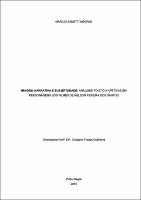| Share record |


|
Please use this identifier to cite or link to this item:
https://tede2.pucrs.br/tede2/handle/tede/6078| Document type: | Dissertação |
| Title: | Imagem, narrativa e subjetividade: análises político-afetivas em personagens dos filmes de Nelson Pereira dos Santos |
| Author: | Negrini, Márcio Zanetti |
| Advisor: | Gutfreind, Cristiane Freitas |
| Abstract (native): | Esta dissertação propõe-se a investigar as relações entre imagem, narrativa e o político por meio da subjetividade. Desse modo, são realizadas análises fílmicas dos aspectos político-afetivos em personagens dos filmes Rio, Zona Norte (1957) e Boca de Ouro (1962), do diretor Nelson Pereira dos Santos. O político é tratado no cinema na perspectiva de Alain Badiou (2004), para quem os personagens manifestam-se politicamente nas formas de resistência às dominações de seus afetos. Com esse pressuposto, procura-se refletir como os personagens Espírito e Boca de Ouro produzem envolvimentos político-afetivos em seus cotidianos. Para isso, mobiliza-se um quadro teórico composto especialmente por Jacques Rancière (2012), Sigfried Kracauer (2001) e Gilles Deleuze (1985). As análises mostram que o político-afetivo dos personagens é formado através de campos de forças produzidos pela relação imagem-afeto-narrativa. Ou seja, ora a imagem revela formas de resistência, e a narrativa, sujeições, ora a narração produz sentidos de resistência e a imagem revela estabilizações nas formas de transformação afetiva dos personagens. |
| Abstract (english): | This dissertation aims to investigate the relationship between image, narrative and the political throughout the subjectivity. In this way, a film analysis are developed based on the political-affective aspects of the characters of the films Rio, Zona Norte (1957) and Boca de Ouro (1962) by the director Nelson Pereira dos Santos . The political is treated in cinema from the perspective of Alain Badiou (2004), due to the fact that the characters manifest themselves politically in forms of resistance of dominations of their affections. With this assumption, it is aimed to reflect on how the characters Espírito and Boca de Ouro produce political-affective involvements in their daily lives. For that, a theoretical framework is composed especially by Jacques Rancière (2012), Sigfried Kracauer (2001) e Gilles Deleuze (1985). The analysis show that the political-affective of the characters is formed through fields of force produced by image-narrative interaction. In other words, in one way the image reveals forms of resistance, and the narrative reveals subjections, in another hand the narrative produces senses of resistance and the image reveals stabilization in forms of affective transformation of the characters. |
| Keywords: | CINEMA PERSONAGENS (CINEMA) SANTOS, NELSON PEREIRA DOS - CRÍTICA E INTERPRETAÇÃO CINEMA E POLÍTICA |
| CNPQ Knowledge Areas: | CIENCIAS SOCIAIS APLICADAS::COMUNICACAO |
| Language: | por |
| Country: | Brasil |
| Publisher: | Pontifícia Universidade Católica do Rio Grande do Sul |
| Institution Acronym: | PUCRS |
| Department: | Faculdade de Comunicação Social |
| Program: | Programa de Pós-Graduação em Comunicação Social |
| Access type: | Acesso Aberto |
| URI: | http://tede2.pucrs.br/tede2/handle/tede/6078 |
| Issue Date: | 10-Mar-2015 |
| Appears in Collections: | Programa de Pós-Graduação em Comunicação Social |
Files in This Item:
| File | Description | Size | Format | |
|---|---|---|---|---|
| 469812 - Texto Completo.pdf | Texto Completo | 1.4 MB | Adobe PDF |  Download/Open Preview |
Items in DSpace are protected by copyright, with all rights reserved, unless otherwise indicated.




